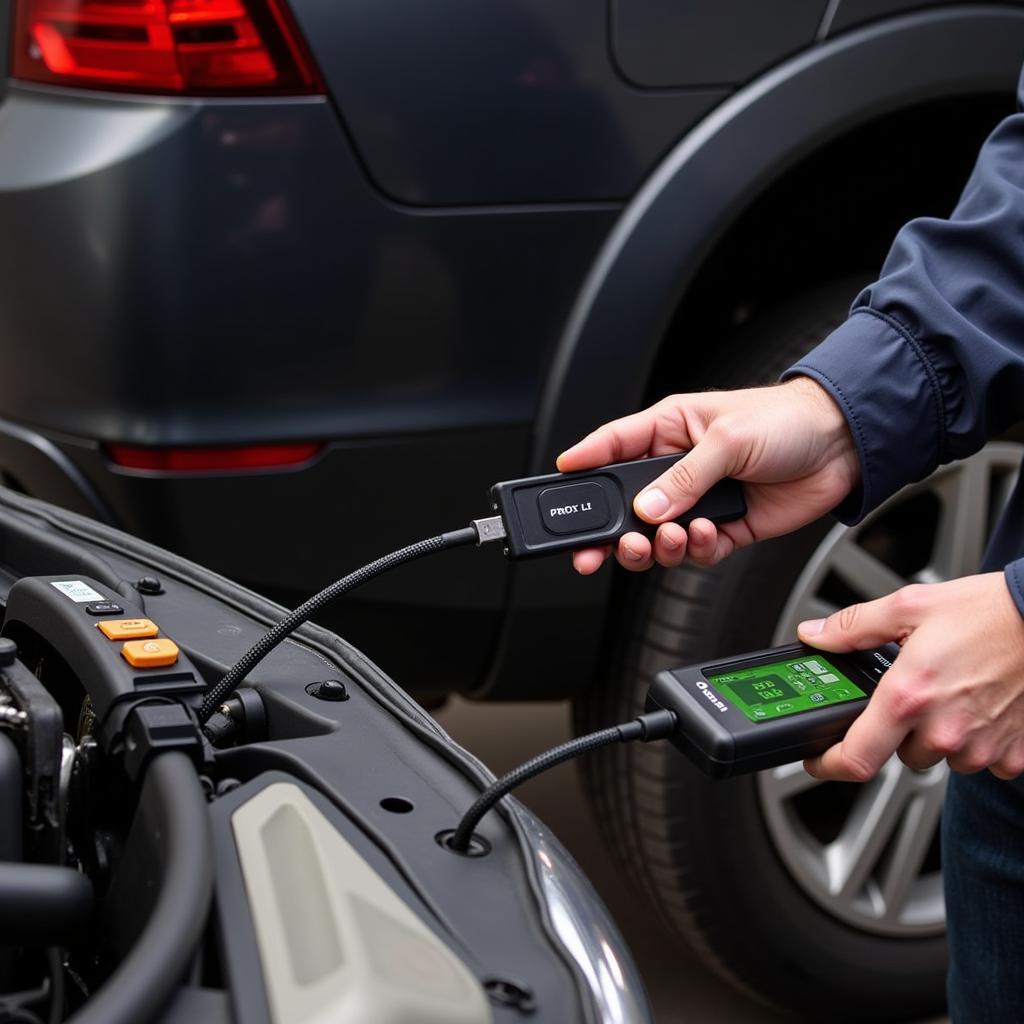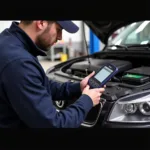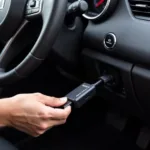OBD2 double adapters, also known as splitter cables, have become increasingly popular among car enthusiasts and mechanics alike. But what exactly are they, and what are the benefits of using one? This comprehensive guide delves into the world of OBD2 double adapters, exploring their functionality, applications, and potential drawbacks.
What is an OBD2 Double Adapter?
An OBD2 double adapter is essentially an extension cable with two female OBD2 ports. It connects to your vehicle’s OBD2 port, allowing you to plug in two OBD2 devices simultaneously. This simple yet ingenious design opens up a world of possibilities for accessing and utilizing your vehicle’s data.
Why Would You Need an OBD2 Double Adapter?
There are several scenarios where an OBD2 double adapter proves to be invaluable:
- Using Multiple Diagnostic Tools: Mechanics and experienced DIYers often use multiple diagnostic tools for comprehensive vehicle analysis. An OBD2 double adapter enables them to connect devices like code readers, scan tools, and performance monitors simultaneously, streamlining the diagnostic process.
- Running Data Loggers and Performance Chips: For performance enthusiasts, an OBD2 double adapter allows running a data logger alongside a performance chip. This setup provides real-time performance data while the chip modifies engine parameters.
- Using OBD2 Devices with Bulky Connectors: Some OBD2 devices have large connectors that might obstruct access to nearby ports. A double adapter provides the necessary clearance, ensuring seamless connection for all your devices.
- Keeping Your Primary OBD2 Port Accessible: By connecting your primary diagnostic tool through the adapter, you keep your vehicle’s OBD2 port readily accessible for other uses.
Things to Consider Before Buying an OBD2 Double Adapter
While OBD2 double adapters offer numerous benefits, consider these factors before purchasing:
- Compatibility: Ensure the adapter is compatible with your vehicle’s OBD2 protocol and the devices you intend to use.
- Cable Length and Quality: Choose an adapter with a suitable cable length for your needs. Opt for high-quality cables and connectors to ensure reliable data transmission and prevent signal loss.
- Build Quality and Durability: Look for a sturdy adapter with a robust housing to withstand regular use and potential wear and tear.
Potential Drawbacks of Using an OBD2 Double Adapter
While generally safe, using an OBD2 double adapter might present a few drawbacks:
- Power Drain: Connecting multiple devices can increase power draw from your vehicle’s battery. Ensure the combined power consumption of your devices doesn’t exceed the battery’s capacity.
- Data Interference: In rare cases, connecting multiple devices simultaneously might cause data interference, affecting the performance of one or more devices.
- Compatibility Issues: While less common with quality adapters, incompatibility between certain devices and the adapter might arise. Always check for compatibility before connecting multiple devices.
Choosing the Right OBD2 Double Adapter
Selecting the right OBD2 double adapter depends on your specific requirements. Consider these factors:
- Intended Use: Determine what devices you’ll be connecting and how you plan to use them.
- Budget: Double adapters are available at various price points, with features and build quality varying accordingly.
- Reviews and Recommendations: Research different brands and models, and read user reviews to gauge the performance and reliability of different adapters.
“Investing in a quality OBD2 double adapter can significantly enhance your diagnostic capabilities,” says John Smith, a certified automotive technician with over 20 years of experience. “It’s a valuable tool for any mechanic or car enthusiast working with multiple OBD2 devices.”
Conclusion
OBD2 double adapters are incredibly useful tools for anyone who frequently uses OBD2 devices. They provide a convenient and efficient way to connect multiple devices, streamlining diagnostics and data logging. By understanding the functionality, benefits, and potential drawbacks of OBD2 double adapters, you can make an informed decision and choose the right adapter for your needs.
FAQs
1. Can I use any OBD2 double adapter with my vehicle?
Not necessarily. Ensure the adapter is compatible with your vehicle’s OBD2 protocol (e.g., OBD2, EOBD, CAN).
2. Will using a double adapter void my car’s warranty?
Using an OBD2 double adapter itself shouldn’t void your warranty. However, modifying your vehicle’s software or making unauthorized repairs might.
3. What happens if my devices draw too much power?
Excessive power draw might drain your car battery or trigger a warning light. Ensure the combined power consumption of your devices is within acceptable limits.
4. Can I leave the double adapter connected all the time?
It’s generally not recommended to leave the adapter connected permanently. Disconnect it when not in use to prevent potential battery drain.
5. Where can I buy a reliable OBD2 double adapter?
Reputable online retailers and auto parts stores offer a wide selection of OBD2 double adapters.
Still have questions or need help with OBD2 double adapters? Contact our expert team via WhatsApp: +1(641)206-8880, Email: [email protected]. We are available 24/7 to assist you. You can also find more information about specific OBD2 adapters, such as the ELM327 OBD2 interface not found, how to pair Carista OBD2, and OBD2 ELM327 Raspberry Pi on our website. We also have guides on related topics, like Rywire B-Series Harness OBD2 and OBD2 WiFi adapter setup, to help you get the most out of your vehicle diagnostics.


